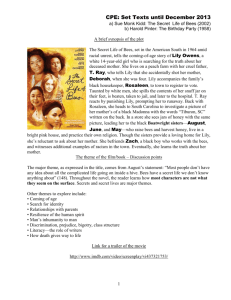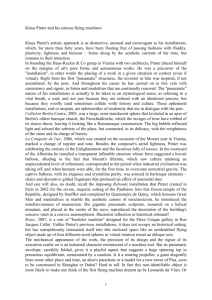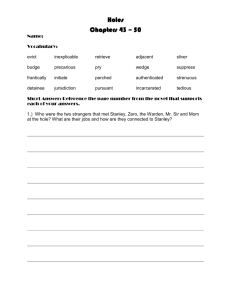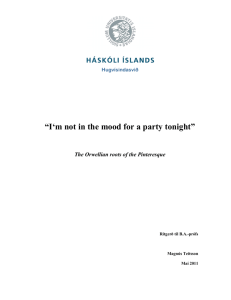Possible Essay Questions for The Birthday Party
advertisement
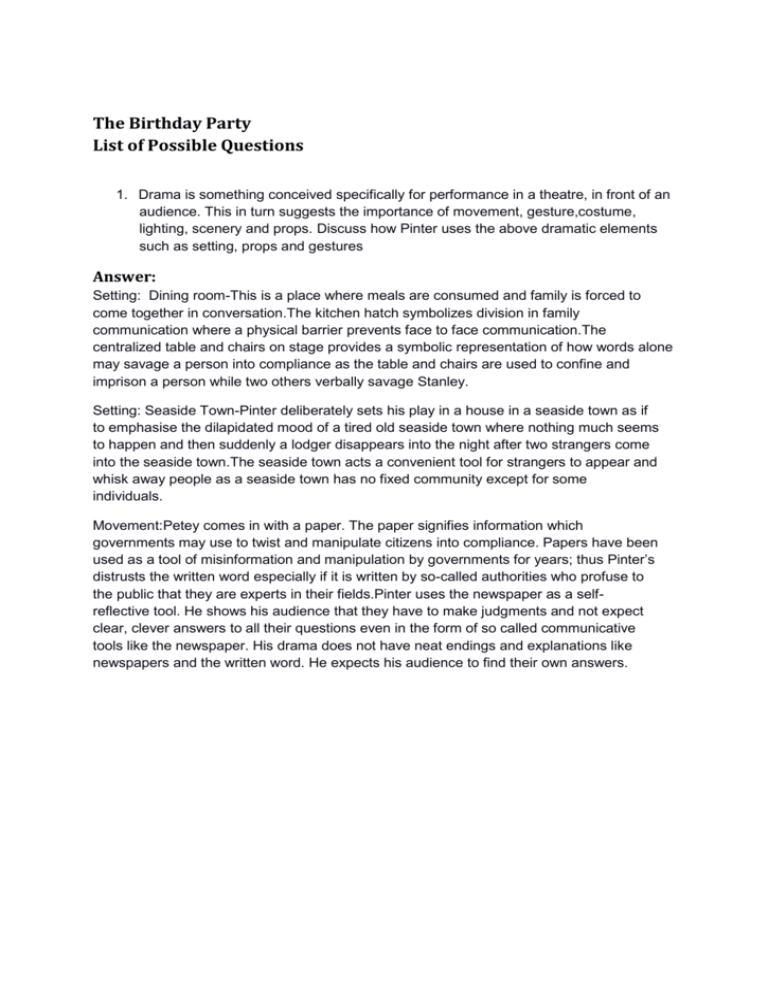
The Birthday Party List of Possible Questions 1. Drama is something conceived specifically for performance in a theatre, in front of an audience. This in turn suggests the importance of movement, gesture,costume, lighting, scenery and props. Discuss how Pinter uses the above dramatic elements such as setting, props and gestures Answer: Setting: Dining room-This is a place where meals are consumed and family is forced to come together in conversation.The kitchen hatch symbolizes division in family communication where a physical barrier prevents face to face communication.The centralized table and chairs on stage provides a symbolic representation of how words alone may savage a person into compliance as the table and chairs are used to confine and imprison a person while two others verbally savage Stanley. Setting: Seaside Town-Pinter deliberately sets his play in a house in a seaside town as if to emphasise the dilapidated mood of a tired old seaside town where nothing much seems to happen and then suddenly a lodger disappears into the night after two strangers come into the seaside town.The seaside town acts a convenient tool for strangers to appear and whisk away people as a seaside town has no fixed community except for some individuals. Movement:Petey comes in with a paper. The paper signifies information which governments may use to twist and manipulate citizens into compliance. Papers have been used as a tool of misinformation and manipulation by governments for years; thus Pinter’s distrusts the written word especially if it is written by so-called authorities who profuse to the public that they are experts in their fields.Pinter uses the newspaper as a selfreflective tool. He shows his audience that they have to make judgments and not expect clear, clever answers to all their questions even in the form of so called communicative tools like the newspaper. His drama does not have neat endings and explanations like newspapers and the written word. He expects his audience to find their own answers. 1. Explain the conflict between the individual and his ideas or values, the individual and his environment or the individual and other individuals. Answer Conflict between individual and his ideas or values Individuals value independence but feel they are powerless against greater forces Individuals generally value their independence except for the following circumstances: -Individuals feel they are powerless against the government Reasons for the conflict Petey’s values derives from the belief that ordinary individuals are powerless against forces greater than themselves, such as the inability of going against the government. He is unable to change even when his is in obvious conflict. This is seen in the scene where Goldberg tells Petey scarily “Why don’t you come with us…” and Petey (broken) can only ineffectually say “Don’t let them tell you what to do Stan” Conflict between individual and environment Reasons for this conflict: Women are powerless against the male chauvinist environment of the 1950s Meg’s role as nurturer vs her need to feel womanly and attractive. This is emphasized through her frequent enquries on how nice her food is but it is clear that she resents this role as seen in her prodding Stanley to validate her as an attractive woman Conflict between individuals and other individuals Dominance vs Subjugation Individuals have power over other individuals due to age, gender and manipulative behavior. This is seen in Goldberg’s dominance over Lulu. He makes her sit on his lap and he goes into her room in the middle of the night. He then quietens her by suggesting that she is a whore as seen in the lines “You have profaned the soil…” Male desire to hold on to power as they feel afraid of women’s inborn power to create life. Stanley puts down Meg’s mothering because he is afraid of her power over him as surrogate mother and creator of life. Male individuals have power over females on the basis of gender and its suggestion that women are inherently evil as religious dogmas have it that women profane the soil by their mere presence. Mccann takes on the role of a priest and assumes the dominance of religious authority over the younger and more vulnberable Lulu. 2. Drama has evolved over the centuries. Greek drama deals exclusively with myths and legends. Shakespeare makes use of magic and the supernatural. Beckett (modern dramatist) has characters living wholly in dustbins or buried up to their waist in earth. Given this kind of liberties, how do dramatists maintain a sense of realism?They resort to psychological realism where it is the thoughts, emotions, desires, needs and fears-the inner life of human beings-that the dramatist wants to be realistic about.. Explain where Pinter lets go of surface realism and gets us to examine psychological realism. Answer Surface realism disappears and psychological realism takes its place. Reasons for this: 1. On the surface the play takes place in a room. However this room becomes a place of imprisonment. Psychologically the dining room transforms itself into a place for interrogation. -Room depicts imprisonment 2. On the surface Goldberg and Mccann are typical visitors to a seaside town, taking part in a birthday celebration for Stanley. Psychologically, both the visitors have fluid occupations and variously take on the role of seducer/priest/music hall players etc to question and threaten Stanley about his worth as an individual. -The visitors who do not have fixed identities threaten and keep Stanley imbalanced with their various roles. 3. On the surface, the games played during the birthday party are mere party games such as Blindman’s Buff. However, the symbolic use of the games creates a sense of terror and menace to the party atmosphere and brings out truths about the various characters in the play. -The idea of using a length of cloth to close one’s eyes is dramatically and psychologically significant. The Blindman’s Buff pictorially depicts torture and interrogative victims. Closing of one’s eyes plunges one into darkness and fear. The subject hears various voices coming out of nowhere and loses his sense of position; creating fear and horror in the mind of the -Room confines individual for ready interrogation and the chairs are used to cage Stanley or violate his physical space to dominate him. -Visitors use Birthday Party to question Stanley’s birth and his worth/value to society. They question his worth as an individual and seem to suggest that Stanley would be better off dead than living a pointless and rebellious existence. The psychological fear of birthdays are used to stunning effect by Pinter to question our worth as social creatures or individuals in our own right. subject. 4. On the surface, the music hall routine during the party seems funny and part of the party atmosphere. MC-You look anaemic G-Rheumetic M-Myopic G-Epileptic However the music-hall words are infused with symbolic weight. Anaemic suggests the almost vampiric feeding off Stanley and other vulnerable people. Myopic suggests that the vulnerable do are willfully blind to the seemingly clever and funny duo making up clever phrases and yet threatening Stanley with the very same funny phrases. -The surface funniness makes us the audience complicit in the torture of Stanley. We laugh at this funny routine just like the other characters in the drama laugh. This socalled funny routine is a way for the two interrogators to get into the mind of Stanley and into the lives of the other characters like Lulu and then going on to destroy them. As we unknowingly laugh with the blind characters, we too are accomplices in the torture of Stanley. 5. Pinter’s plays are variations on the subjects of :Dominance vs Subjugation, Control vs Losing Control and Victor vs Victim. These are all models of power structures. Provide examples from The Birthday Party on all of the above. Answer Dominance vs Subjugation -Characters are dominant on the following basis-age, gender and occupation -McCann takes on the role of assistant to Goldberg as he is younger than Goldberg. Assistant here takes on a less authoritative function. -Lulu and Meg are both submissive to the men in the play. This submission is due to religious dogma that women are profane and due to the idea that age somehow diminishes the terrible powers that women have over men as mothers and creators. The motherly Meg who attempts to change the power structure is put in her place by Stanley who calls her ‘succulent old washbag” Control vs losing control -Characters control through words and actions-Meg tries to control Stanley by tickling him and ‘’mothering’’ him. She loses her control over Stanley as soon as he labels her ‘’old ‘’ -Characters are shown to lose control by the metaphorical losing of glasses or being blindfolded. -Stanley tries to control the situation with Mccann and Goldberg by accusing them of fraud but they turn the table on him by blindfolding him and then taking away his glasses and not letting him see clearly. -Characters lose control against powerful institutions like religion and the government. -Lulu tries to control Goldberg by accusing him of rape/ molest and yet he turns the table on her by accusing her of being a whore and shutting her up when Mccann asks her to confess and kneel as if he is a priest in the presence of a whore. Victim-Victor -The irony of seeing Goldberg as victim comes in the scene where he was saved by his own assistant Mccann. Lulu confronts Goldberg about coming to her room at night but Mccann steps into the breach by victimizing Lulu and painting her as a whore. The victim Goldberg suddenly becomes victor as he joins his assistant in tormenting Lulu. 6. In The Birthday Party, the growing atmosphere of menace and the destruction of Stanley’s personality is conveyed by riddles, children’s games, music-hall cross-talk routines. Provide examples and explain how these contribute to the theme of dominance and victimisation Menace and destruction of Stanley conveyed through: Riddles G to S-is the number 846 possible or necessary? S-Neither G-Wrong. Is the number 946 possible or necessary? S-Both G-Wrong. It is necessary but not possible. G-Wrong! It’s only necessarily necessary! We admit possibility only after we grant necessity. 2nd Riddle M-What about Albigensenist heresy?(This leads to a Christian crusade against socalled infidels and was a subject of the Spanish Inquisition) 3rd Riddle G-Why did the chicken cross the road? S-He wanted to-He wanted to… G-Why id the chicken cross the road? S-He wanted M-He doesn’t know. He doesn’t know which came first? But the riddle that G asked was not “which came first; the chicken or the egg’’ -Idea of miscommunication. Not answering questions because it is wrongly put or questioners quickly change the question and change the agenda to suit their own purpose. Contributions to theme 7. Discuss Pinter's dramatisation of menace in The Birthday Party 8. How far can words alone create menace and fear in the play, The Birthday Party? 9. Discuss how language is used to intimidate and terrorise the individual in The Birthday Party Points to help you answer the above questions Language Devices Their functions the rhythms of colloquial speech “Why do you pick your nose?” repetitions of colloquial speech S-What succulent? M-you should not say it to a married woman seeming submissive agreement to her demanding empty speeches. M-Are they nice P-very nice - an interrupted monologue through the partial disconnection this entails ("Petey: I don"t think you know her. / Meg: What"s her name? / Petey: Lady Mary Splatt. / Meg: I don"t know her.") Pinter has skilfully captured exactly the dialogue of two elderly people talking, but not listening. Petey who controls information in such a way as to manage his wife as he sees fit to do: the almost complete absence of concrete reference points: nothing truly tangible, physically or mentally, is under discussion. all he can do is ask for clarifications and explanations, automatically feeding interrogatives back to Goldberg having been reduced to a infantile state of uncomprehending bewilderment loquacious extravagance with which Pinter imbues many of his characters The more common is that of Goldberg in The Birthday Party, dubbed by Pinter in his 1962 speech to the National Student Drama Festival "a torrent of language". One way of looking at speech is to say that it is a constant stratagem to cover nakedness. Regardless of the context in which these monologues take place, the universal lack of the pronoun 'you' in them creates their internalised, confessional tone. Goldberg and McCann allude to what they perceive Stanley's failings to be, both sexually and financially, to break him down through the dramatic principle underlying the process – In The Birthday each victim is reduced to a verbally nonsensical state. With five pauses in his last speech, Stanley recognises the total futility of verbal communication against Goldberg’s resolve. He is left without any means of expressing himself, Goldberg: Well, Stanny boy, what do you say, eh? They watch. He concentrates. His head lowers, his chin draws onto his chest, he crouches. Stanley: Ug-gughh ... uh-gughhh. ... McCann: What's your opinion, sir? Stanley: Caaahhh... caaahhh... . McCann: Mr Webber! What's your opinion? Stanleys body shudders, relaxes, his head drops, he becomes still again, stooped. Goldberg: Still the same old Stan. Come with us. Come on, boy. Checklist of possible questions for The Birthday Party Thematic Questions Setting 1. The real key to The Birthday Party's survival capacity: it is set in a seaside boarding-house and opens the door to terrible happenings.” How far do you agree with this reading of The Birthday Party? 2. In what ways and how effectively does Pinter manage to jolt his audience ‘from their zone of comfort through the manipulation of setting. Power /state/authority/dominance 3. How effectively does Pinter “ruthlessly criticise social institutions” in The Birthday Party?/Dominance/State 4. How effectively does Pinter present individual characters in the play as ‘victims of forces greater than themselves’? 5. Discuss Pinter’s dramatisation of the relationship between language and power in The Birthday Party Women 6. How far do you agree that Meg is always the victim of other characters’ aggression? 7. What, in your view is the significance of the women characters in The Birthday Party? History and Memory 8. How effectively does Pinter examine memory and history in The Birthday Party? Language Questions 9. Pinter’s plays focus on characters who deliberately evade communication. In what ways and how effectively does Pinter present this deliberate evasion of communication? 10. Discuss how effectively Pinter dramatises characters’ intolerable wrestling with words and meaning in The Birthday Party 11. Discuss Pinter’s dramatisation of the relationship between language and power in The Birthday Party Characterisation Questions 12. By what means and how effectively does Pinter get his audience to ‘invest in his characters in The Birthday Party? 13. How far do you agree that Meg is always the victim of other characters’ aggression? Dramatisation Questions 14. What is surprising about The Birthday Party is that, even if it leaves much unexplained, it still boasts familiar landmarks : it has a traditional three-act structure. It is also full of mystery and suspense. Discuss Pinter’s use of familiar dramatic landmarks in The Birthday Party 15. By what means and how effectively does Pinter merge the comic with the tragic? 16. To what extent do you see Stanley as being a victim of circumstances beyond his own control? 17. How effectively does Pinter use comedy to heighten terror in The Birthday Party? Context Questions 18. With close attention to language and tone, discuss the effectiveness of the passage as a dramatic ending to the play. 19. Write a critical appreciation of the following passage, highlighting the ways in which Pinter creates tension and mystery at this point of the text. 20. Write a critical appreciation of the following passage, relating it particularly to the dramatisation of dominance and subjugation here and elsewhere in the text.
